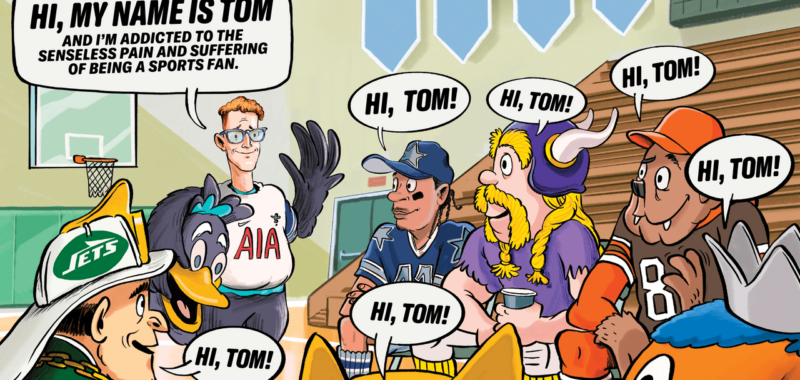About a year ago, while watching his team lose a must-win game, a fan of the Dallas Cowboys named CJ Boyd removed his replica jersey, balled it tight, and hurled it off the balcony of his apartment in DeSoto, Texas. While his partner looked on, filming Boyd’s tantrum on her phone, he chased his floating jersey outside, where he picked it up to hurl it farther along the street. He was topless. It was winter. Boyd didn’t feel the cold, he told me, for misery. The clip of his outburst circulated online, and when I watched it I thought: Yeah, that captures it—the circular pain of a fully felt love for a sports team, the seeming impossibility of escape. In the video, Boyd marches up and down the street renouncing, then retrieving, the jersey, never able to throw it far enough to be free.
When a spark has gone, lovers may separate and spouses divorce. Businesses are dissolved all the time without acrimony. Friends quietly stop texting one another. We abandon unsatisfactory jobs, apartments, political parties. Why should it be different with a team?
Of all the many rules governing human behavior—stuff codified by law, etiquette, or religious decree to steady interpersonal relations—the only universal taboo I can think of that’s rational, legally sound, ethically neutral, yet carries the social equivalent of the noose is the ditching of a sports team. Among fans, there’s no excuse that will account for it. No exit papers or under-the-table permissions may be obtained. It’s bone-felt, beyond argument, and if you care to know anything about sports, you know that however degraded, bored, impoverished, or exhausted a fan may feel, their continued fidelity is expected, no matter what.
In Michigan, a few years ago, it made its way from local to national news that a family, the Carpos, had decided to give up the Detroit Lions, tired of years and years of losing. It was a sensation, an outrage. When David Cameron was on the verge of being reelected British prime minister in 2015, commentators saw it as an awful portent that he could not seem to remember which fan base he belonged to: Hammers or Villans. Before the director Steve McQueen was underway on his name-making movie, 12 Years a Slave, he was fanatical about an English football team, Tottenham Hotspur. “I gave up football,” McQueen told an interviewer in January 2014. “It affected my day too much. It’s just stupid.” Within a couple months of that unusual admission, McQueen was the proud owner of an Oscar for best picture. A Tottenham fan myself—affected by it, made stupid by it—I imagined a cosmic link between the two events. In renunciation, McQueen seemed to have found peace, and reward.
That was a decade ago, and also when I first started to dream about bailing out, imagining the many ways the emotion and ambition I wasted on a sports team might be better spent. I felt like a reasonably well functioning adult, a fun parent, a listening spouse, a reliable wage earner…. But only till about 3 p.m. on a Saturday, at which point I became a pacing, pink, grudge-holding bore with a fuse the length of a fingernail. I was perfectly prepared to obliterate all sorts of cheerful occasions with thermonuclear sulks about sporting contests I had no control over.

